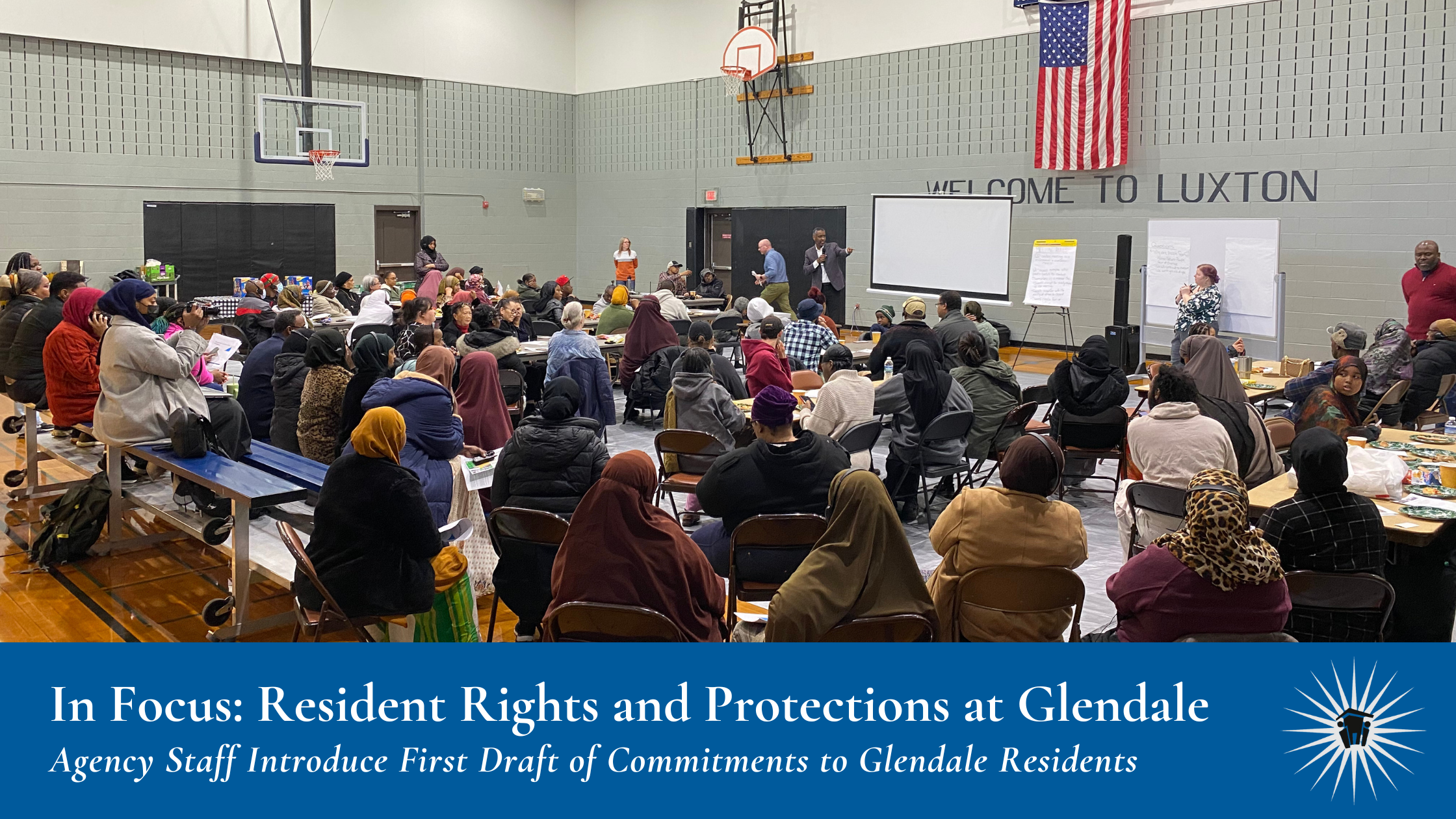This past weekend, Glendale residents gathered for the latest community meeting to discuss Glendale’s future. The meeting began with a welcome from Glendale’s City Councilmember, Robin Wonsley, before agency staff opened the meeting up for resident questions and comments.
In the largest community meeting to-date, residents asked a variety of questions that turned into robust conversations about project timelines, resident protections related to any construction-related temporary relocation, and the financial reasons why MPHA and housing authorities around the country use the U.S. Department of Housing and Urban Development’s (HUD) Rental Administration Demonstration (RAD) program for major renovation and development projects.
Following the initial question and answer session, agency staff presented a first draft of resident commitments and protections that will accompany any future large-scale renovation and/or redevelopment at Glendale.
From the beginning, residents have repeatedly shared their concerns about relocation, displacement, and their ability to return to Glendale as a part of any major construction project. Residents have expressed fears that their family will lose their home and not be welcomed back to their community after construction is done.
While agency leaders have worked to assure residents they would not be displaced against their will, leaders also pointed to the recent Elliot Twins RAD Project, Family Housing Expansion Project (FHEP), and Springs Manor RAD Projects as evidence of the agency honoring its commitment of no involuntary resident displacement. These recent projects also serve to illustrate the way MPHA centers residents’ experience to guide the development process from start to finish. Additionally, MPHA is expressly prohibited from involuntarily displacing residents through RAD redevelopment and residents’ right to return to a redeveloped property is protected by federal and city regulations.
However, despite these facts and assurances, displacement concerns persist. So, to help relieve the fear and anxiety some residents feel, MPHA is creating a set of clear, measurable commitments to Glendale families around any large-scale renovation and/or redevelopment at the site.
The first draft of commitments to Glendale families presented during the April meeting include:
Commitment #1: MPHA Will Center Resident Voices in Renovation/Redevelopment Process.
Commitment #2: MPHA Will Continue to Provide Residents Factual Information Throughout This Process.
Commitment #3: Rent Calculations Will Remain At 30 Percent of Household Income.
Commitment #4: MPHA Will Work with Every Resident Individually to Identify a Relocation Option that Accommodates Their Unique Needs.
Commitment #5: MPHA Will Work with Residents to Develop a Relocation Contract That Includes MPHA Commitments and Resident Rights Throughout the Relocation Process.
Following the presentation on the first draft of MPHA’s commitment to Glendale families, staff solicited initial feedback and comments. As with the four initial renovation/redevelopment approaches, agency staff will spend the coming months working with residents to further develop, expand, and refine these commitments, leveraging the learnings from the Elliot Twins and Spring Manor RAD projects to provide residents with additional assurances and guarantees.
Following the introduction of the draft resident commitments, agency staff closed the meeting by revisiting the recently shared renovation and/or redevelopment approaches. Staff restated the four approaches and solicited additional resident feedback to help guide future plans.
The next step will be capturing all resident feedback shared thus far and refining both the renovation/redevelopment approaches and the resident commitments to present updated drafts for consideration and feedback during the May resident meeting.
During the May meeting, residents will also have additional clarity about Prospect Park Association’s (PPA) effort to designate Glendale historic, which would severely limit the options residents can consider for Glendale’s future. While MPHA continues to oppose PPA’s efforts, should Glendale be designated historic, residents will be shut out of considering any major redevelopment options addressing the greatest number of resident priorities. Under this scenario, agency staff would need to reassess the options available to residents under the associated historic building guidelines and restrictions.
Regardless of the outcome of PPA’s effort to designate Glendale historic, MPHA staff will continue to work with residents through the spring and summer before finalizing the framework that will guide the future of Glendale. Stay up to date with MPHA’s work at Glendale here.



